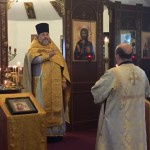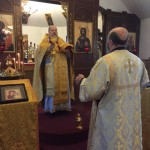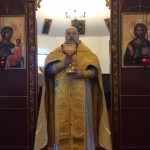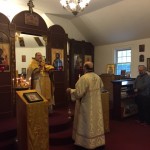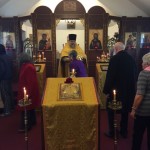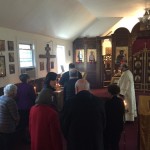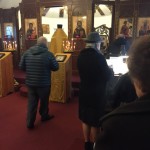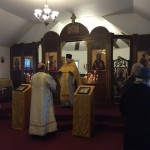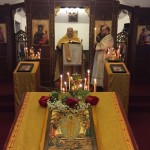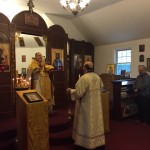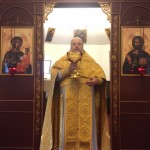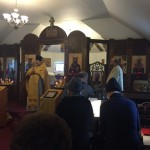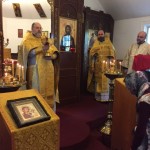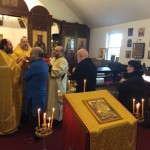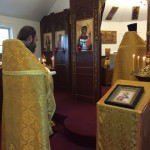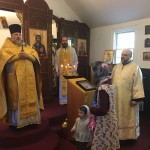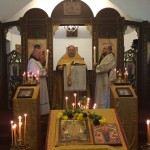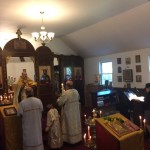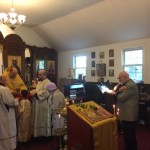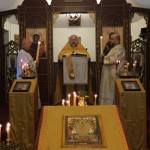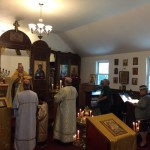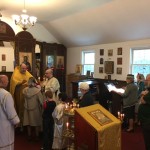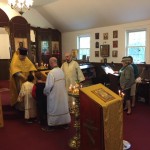On November 27, on the 23rd Sunday after Pentecost, St. George Parish held a beautiful liturgical celebration. Our Rector, Archpriest Igor Tarasov headed the Divine Liturgy. Following the Gospel lesson he preached a homily in Russian. An English translation of that homily is as follows:
“Dear brothers and sisters in Christ! Today in the Holy Gospel we heard a parable about a Good Samaritan in which Christ is telling us about salvation. Some lawyer which means a scholar of Jewish religion asked Jesus a very important question, “Teacher, what shall I do to inherit eternal life?” (Lk. 10, 25). Of course, this scholar tested the Savior, tried to argue with Him and to show Him his knowledgeable superiority. But this question is really important: what should be done to be saved? At this question Christ is asking another, no less important question, “What is written in the law? What is your reading of it?” (Lk. 10, 26).”
“Christ puts everything in a right order. He immediately shows who is who in this conversation, who is the Savior and who is the saved one. From now on the lawyer is not testing Jesus but Jesus is testing that Jewish scholar. We should notice that the scholar gave a right answer, he rightly indicated to what Jesus Himself called “the foundation of the law and the Prophets: “You shall love the Lord your God with all your heart, with all your soul, with all your strength, and with all your mind, and your neighbor as yourself” (Lk. 10, 27). However, giving a right answer the lawyer does not understand who is his neighbor. In the ancient Judaism the neighbor was considered your compatriot while a stranger was not viewed as a neighbor, thus according to the Law of Moses he could not be loved as oneself. With modern Christians it could be just the opposite: we are readily help to the needy somewhere in a remote country, but we do not notice the need of the people around us.”
“To answer that question, “who is my neighbor”, Jesus tells a parable about a Good Samaritan. This is the parable about Christ who came to save the dying humanity. A Jew who would listen to that parable could relate to the man who fell among thieves. And perhaps the Lord wished to create such an understanding of this parable. But a more profound sense of that story is that this unlucky man represents the whole human kind who had been robbed and bitten by the devil, so being half dead and covered with the wounds of sin, it could not reach its destination which is the Kingdom of heaven.”
“And behold there appears a Samaritan, a man strange to the Jews. Samaritans were considered heretics and sectarians, they were the enemies of the Jews. But he helps that man on the road. That Samaritan is an image of Christ, the Savior of the humanity. And we should notice that our Lord Jesus Christ, although He was born as a Jew, was very often rejected by the Jews and viewed as a heretic. In one passage of the Gospel we read, “The Jews answered and said to Him, “Do we not say rightly that You are a Samaritan and have a demon?”” (Jn. 8, 48). And yet in the parable a man strange and hostile to the Jews is rescuing a Jew. Revealing the mystery of salvation Christ is telling how a Samaritan rescued a man from certain death. But he did not just rescue that man, he also took care of him until he was going to become well, he paid for the care and treatment and he promised to come back.”
“The parable also mentions a priest and a Levite who passed by (Lk. 10, 31-32). What can we say about them? Perhaps these people were not really bad, cruel or indifferent. They were heading to the Temple to fulfill the Law, and to touch a man who could be already dead, would defile them and would make them unfit to fulfill their obligations. Thus, on one hand, they were right in their actions, however the story gives them no justification. Christ made it very clear to His listeners that the Law does not save a man and that the Law can be fulfilled, but a man may die.”
“This is important for us to understand during the days of prescribed fasting. Tomorrow we will begin the Nativity fast. The Church calls us to fast, but the fast by itself is not a goal. You can fulfill the law and fast, but at the same time you may not help the needy, may not fulfill the works of mercy.”
“Thus, this parable is very symbolic. Among the symbols is a Jew on the road who is the whole dying humanity; a Samaritan who is Christ the Savior; bandaging the wounds and pouring of oil and wine is spiritual healing; the inn and the innkeeper is the Church to whom Christ left His wealth, the grace of the Holy Spirit to care about human souls; finally a Samaritan’s promise to come back is our Lord’s second coming. But all these meanings were hidden from the first listeners of the parable. The only thing they did understand is that it is bad to be robbed and bitten while it is good to be rescued. And that initial understanding was enough.”
“Thus when the scholar of law understood what is good and what is bad, Christ gives him a command, “Go and do likewise” (Lk. 10, 37). Here the Lord reveals another mystery of salvation. He reveals what do we need to enter into eternal life. Thus in those words – “go and do likewise” – is the answer of Christ to the scholar’s question. Salvation is cooperation with God. It is not enough to be forgiven, not enough to be justified, not enough to be healed – you need to act in the same way, to become like Jesus, to become His Body. As St. Paul says, “It is no longer I who live, but Christ lives in me” (Gal. 2, 20). It is not enough to know what is good, you need to do it.”
“Dear brothers and sisters! Those who know about faith, about good and about morals are many among us, but those who labor are few. The dreamers are many, but the actors are few. The called are many, but those who respond to the calling are few. Therefore, let us fulfill the Savior’s command, let us go and do likewise. Then we would become worthy to enter into eternal life!”
As the Liturgy continued, the Rector included a petition of thanksgiving into the Litany of Fervent supplication due to our recent celebration of Thanksgiving Day. The choir prayerfully performed the hymns dedicated to Holy Apostle Philip whose memory was celebrated on that day.
After the Liturgy dismissal the Rector preached a short sermon in English to stress the main ideas of his Russian homily.
Following the Liturgy the Rector served a Memorial service (Litia) at the request of Malyshew family to commemorate the deceased Elena, the late wife of our parishioner and Sacristan Andrew Malyshew.
After all our services had been finished the Rector and parishioners enjoyed delicious meals, including a Thanksgiving turkey, at the trapeza table.

